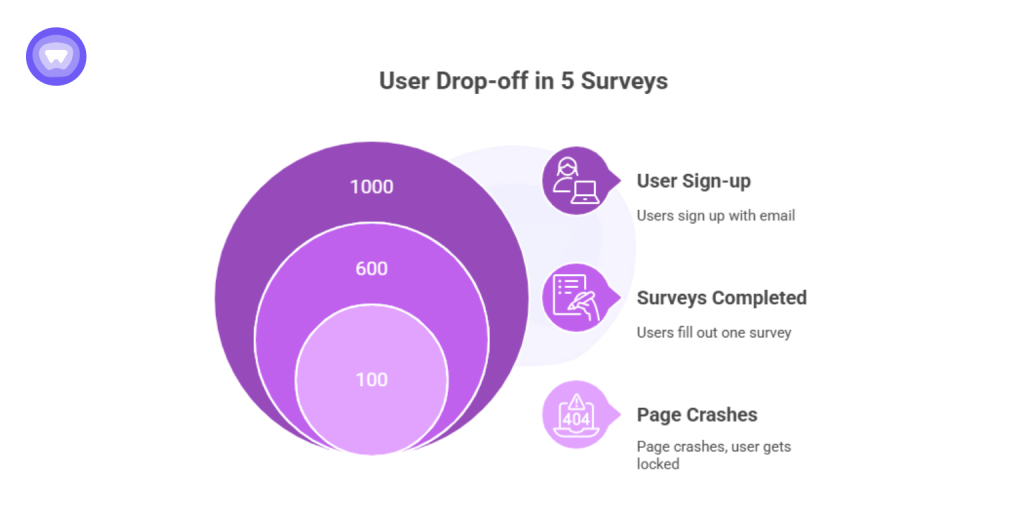Quick cash is always tempting. Spend five minutes clicking through a few questions, get $5 in return—what could go wrong? That’s the promise platforms like 5 Surveys make. But if you’ve landed on this page, you’ve probably asked yourself: Is 5 Surveys legit?
Let’s unpack it. Because while the idea of easy survey money sounds harmless, the reality is more layered. Especially for privacy-conscious users and those managing online brands or reselling VPN tools.
What Is 5 Surveys and Why Is It a Concern for Businesses?
5 Surveys pitches itself as a quick-money platform: complete five surveys and get paid. Users log in via email, fill in demographic data, and start the process. But here’s where things turn.

The moment a user enters this funnel, they’re often exposed to:
- Ad-heavy landing pages
- Embedded trackers and session cookies
- Aggressive lead-generation scripts
- Potentially spoofed or phishing survey redirects
For businesses that prioritize user privacy, this is a data breach waiting to happen. Even if your product isn’t connected directly to 5 Surveys, if your users interact with it from your network or mobile app, you inherit the risk indirectly.
If someone logs in from your ecosystem, clicks a link, and ends up sharing personal details to a spoofed 5 survey login prompt, guess whose brand they’ll remember? Yours.
Where the Data Trail Begins?
When you register for a survey platform like this, you’re not just providing answers. You’re giving them:

- Your email
- Your location and IP
- Your device info
- Behavioral data via cookies and trackers
Every click, every pause, every redirect—it’s all recorded. 5 Surveys might be paying out small amounts, but in return, it’s collecting a user profile valuable to ad networks and data brokers.
This isn’t about just five surveys anymore. It’s about becoming part of a data supply chain that most users don’t realize exists.
What Users See vs. What’s Happening Behind the Curtain?

On the surface:
- A modern-looking UI
- A simple reward model (“5 surveys 5 dollars”)
- Login and demographic questions
- Lists of available surveys
Behind the scenes:
- Browser fingerprinting
- Persistent tracking
- Redirection through third-party ad networks
- Questionable use of cookies for affiliate fraud
When users complain that 5 surveys no surveys are showing up, it’s often because the platform has already captured enough data on them, and now chooses to serve someone else.
This kind of data-first monetization exposes your users to unnecessary risk. And if you’re running a B2B product with user trust at its core, proximity to platforms like these can become a problem.
The $5 Surveys Pitch: Real Reward or Bait?
That “$5 for 5 surveys” promise is what pulls people in. But let’s be real, anyone rarely gets paid that easily.

Complaints all over Reddit and Trustpilot reference repeated issues:
- “I completed the surveys but never got credited.”
- “After one, they told me I didn’t qualify.”
- “My account went under review with no reason.”
These aren’t edge cases. They show a consistent pattern. If you’re seeing Five surveys account under review or errors like Five surveys technical error, you’re not alone.
The payout model is confusing. Some users report needing to accumulate points over time. Others mention a mysterious “manual review” before any rewards go out. That’s a red flag, especially when you consider you’re sharing data upfront.
The Legitimacy Debate: Is 5 Surveys a Scam?
Is 5 Surveys a scam? That depends on how you define scam.
Technically, many users do receive gift cards or PayPal payouts. But the ratio of effort to reward is low. And the data you trade along the way—well, that’s worth far more than $5.
Some survey listings redirect to third-party sites. Others request account credentials, crypto wallets, or suspicious ID verification. There’s even talk of impersonated surveys under the tag Five surveys survey police, pretending to check your “security compliance” before releasing funds. It’s wild.
When legit users get locked out of their accounts, flagged for “suspicious behavior,” or simply ghosted after completing tasks, the term “scam” starts to fit—at least loosely.
What Happens to Your Info?
Here’s where it gets darker. Once you’ve filled in your first 5 surveys, the data isn’t just sitting in one database.
5 Surveys and similar platforms often work with multiple ad networks and affiliate programs. Your email may be funneled into lead-gen campaigns, your IP tagged for retargeting, and your device ID sold to advertisers.

You may suddenly see:
- Personalized scam emails
- Spam SMS messages
- Ads that know way too much about your interests
And if you’ve ever typed in sensitive information—say, your full name or address—you may even get flagged in phishing databases. All for five bucks.
Fakes, Spoofs, and “Too Good To Be True” Pages
Another problem is brand spoofing. Many of these surveys mimic big-name brands to look trustworthy.
You might get a “Netflix survey” or “Amazon gift card” offer, but it’s hosted on a generic redirect site. Some emails are styled exactly like Apple or USPS, trying to trick users into revealing login info.
If you’ve ever seen one of these and thought, “Wait, did I just give them access to something?” — you’re not alone. This isn’t just shady marketing—it’s phishing with extra steps.
Reviewing Complaints: The Red Flags Stack Up
You don’t have to look far. Type “5 survey reviews complaints” into Google, and you’ll find:

- Users being redirected to fake job or crypto sites
- Missing payouts
- Account blocks due to “suspicious activity”
- Surveys that never complete
- Errors like Five surveys technical error and Five surveys account under review
All of these not only reflect poorly on the platform but also hint at questionable backend operations, possibly linked to data resellers, affiliate arbitrage, or phishing ecosystems.
If you’re building a brand that deals with finance, productivity, health, or remote access — do you really want to leave your customers exposed to this?
Data Misuse in 5 Surveys: The Privacy Risk You Can’t Ignore

Most 5 Surveys complaints follow the same narrative:
- A user signs up using their email
- They fill out one or two surveys
- Then the page crashes, or they get locked out
- Suddenly, they’re getting spammed—email, SMS, even calls
It’s clear their data was harvested — name, age, email, location — and likely sold to third-party advertisers, fraud campaigns, or affiliate networks.
What makes this dangerous from a business perspective?

- It erodes customer trust
- It creates compliance headaches (especially under GDPR/CCPA)
- It damages your product’s reputation by association
You’re only as secure as the weakest site your user visits through you. And 5 Surveys isn’t just weak — it’s wide open.
Why VPN Integration Can Stop the Damage Before It Starts?
This is where enterprise VPN solutions make sense — not for B2C privacy alone, but for platform integrity and B2B liability reduction.
A white-label VPN integrated into your app or offered as a companion solution does the following:

- Blocks known scam sites and affiliate redirect domains
- Masks IPs and geolocation, reducing behavioral tracking
- Encrypts sessions, even on shared Wi-Fi or mobile
- Filters DNS, preventing background data calls from survey scripts
- Flags phishing pages styled to mimic real brands
This isn’t about shielding one user — it’s about scaling security across your user base without compromising speed or UI.
Why a White Label VPN Makes Strategic Sense for Your Brand?
Here’s the real opportunity:
If you’re a SaaS product, fintech tool, or online service provider and your customers value trust — you have every reason to own your VPN layer.
A white-label VPN gives you:
- Your own branding
- Your own pricing
- Seamless integration into existing user flows
- Full control over marketing, UX, and policy
- No dependency on third-party APIs you don’t control
Platforms like Fivesurvey may be out of your control — but how you protect users from them isn’t.
The Bigger Picture: User Safety as a Brand Value
Users today don’t just want security — they want silent security. They want tools that protect them without friction. When you build that into your service offering, your brand becomes stickier.
You also give users a reason to trust your platform beyond just features:
- “This app blocked a fake survey site I didn’t realize was dangerous.”
- “Their VPN showed me I was being tracked through 10 ad pixels on a page.”
- “They warned me before I opened a suspicious redirect.”
These are retention drivers. Not marketing gimmicks.
Final Thoughts
5 Surveys and platforms like it will keep popping up. Why? Because they work—for the people running them. They harvest data, game affiliate programs, and profit off deception.
Your customers? They get breadcrumbs and risk.
If your business offers digital experiences—anything that touches web access, content, identity, or productivity—you need to think like a privacy-first brand.
Because once users get burned by these traps, they’ll start asking hard questions:
“Why didn’t your platform protect me?”
“Why didn’t I get a warning?”
“Why did this scam come through your app?”
And if your answer is “We didn’t know,” it won’t be enough.


